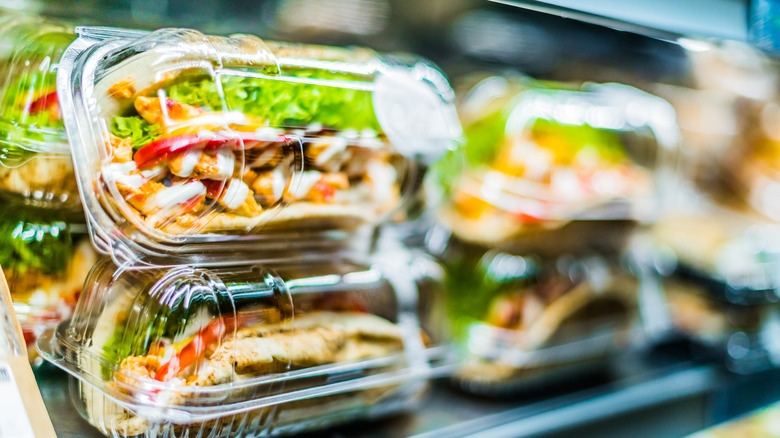Do You Need To Toss Bloated Food Packaging Immediately?
When you're in the grocery store, you might have seen someone taking dented canned goods off of the shelves. If you're cleaning out the fridge, you may find a piece of cheap meat that you had purchased and forgotten about, still wrapped in its plastic wrap and feeling "squishier" than usual. You may have also seen damaged, dented, or torn boxes of cereal, pasta, and other dried goods being sold at a steep discount.
Needless to say, when it comes to food and its packaging, it's incredibly important that the packaging of any product, wet or dry, be kept in as pristine condition as possible. If you were to see a "dented" can or a pork chop in a "bloated" plastic package, it's a clear sign that something may be wrong with it. The Centers for Disease Control and Prevention warns that damage of any kind to a canned good may be a sign of botulism, a rare but serious disease that can cause breathing problems to muscle paralysis. While your average grocery store may not sell too many "damaged" goods, certain "salvage grocers" sell products that are damaged or past the sell-by date, via Good Morning America, which means knowing which foods are safe to eat or to avoid is key for when purchasing low-cost goods.
But does every bloated or dented package mean that the meat or vegetables inside are crawling with disease? How can you tell if such a product is safe to eat, to begin with?
Some bloated packages may just be due to pressure
Food scientist Wei Zhang of the Illinois Institute of Technology explains to Taste of Home, certain packaged foods may react differently to increased altitude. An example Zheng gives is taking a packaged product to Denver, where the product will begin to "bloat" or expand. It's not because the food inside the packaging has gone bad, but it's because the pressure inside the sealed package is higher than the low-pressure air outside, causing the plastic to rise.
Some "bloated" packages are even meant to act that way, according to EatingWell. Products like meat or cheese may be packaged inside what is called "Modified Atmosphere Packaging," which contained gases that are meant to help preserve the product for a longer period of time. In this case, the bloated packaging is of no harm and you can enjoy the food inside without any risk of health consequences.
But why exactly do packages "bloat" or expand if they start to spoil?
The spoiled food inside builds up gas
According to Food Safety, the swelling of a package is usually caused by the build-up of gases, similar to the "Modified Atmosphere Packaging" mentioned earlier. Unlike those specially-designed packages, however, the build-up of gas in spoiled food comes from carbon dioxide, which itself is a by-product of microbial growth. This means that bacteria have compromised the sealing of the packaging or are naturally occurring inside, with the bacteria feeding on the contents of the packaging and generating gases as they break it down.
A bloated package, however, can't be the only sign the food has spoiled. As mentioned before, it's entirely possible that said bloating is from a change in air pressure. Today offers several pieces of advice on judging whether your meat has spoiled, so you can be confident that you aren't throwing out a perfectly good product. If the product is definitely spoiled, it's best to immediately dispose of the product and clean the area that it was occupying to prevent the spread and growth of more bacteria on your other foodstuffs.


